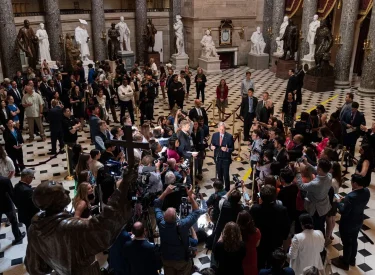
FILE - House Speaker Kevin McCarthy of Calif., speaks to reporters about debt limit negotiations, Wednesday, May 24, 2023, on Capitol Hill in Washington. (AP Photo/Jacquelyn Martin, File)
WASHINGTON (TND) — Members of both parties debated the merits and drawbacks of a new debt and budget bill Wednesday afternoon before a final vote to raise the nation’s borrowing limit.
The “Fiscal Responsibility Act of 2023” contains the agreement reached by Speaker of the House Kevin McCarthy, R-Calif, and President Joe Biden over raising the debt ceiling ahead of a government default around June 5 while also putting a limit on government spending. Both major branches of the deal would last into 2025.
While the Treasury Department initially forecast the government would reach its borrowing limit on Thursday, earlier this month Secretary Janet Yellen moved that date to June 5. If Congress is unable to pass an agreement to raise the debt ceiling – the amount of money the U.S. government can borrow to pay off its existing debts – by that date, the U.S. would be forced to default, which would not only almost certainly lead to a recession but also a global economic upheaval. However, since the U.S. has never defaulted before, economists do not know what the extent of such economic consequences would be.
The president and Speaker announced late Saturday that the pair reached an “agreement in principle” after weeks of intense negotiations and months of trading barbs through the press. While not the “clean” lift of the debt limit sought by Biden, McCarthy also gave up stronger Republicans demands for cuts to federal spending projects and caps on ongoing spending levels. The bill passed its first hurdle to become law Tuesday night when it barely passed out of the House Rules Committee in a 7-6 vote, with two Republicans from the House Freedom Caucus joining all Democrats on the panel in opposition of the bill.
The Fiscal Responsibility Act would suspend the debt ceiling until 2025, even raising it by $4 trillion over the next two years, while keeping federal spending levels roughly flat for fiscal year 2024 and raising them by 1% for fiscal year 2025. The legislation also raises the upper age limit for work requirements for the Supplemental Nutrition Assistance Program (SNAP) from 49 to 54 by 2025 (with those requirements reversing in 2030), ends the freeze on federal student loan payments, cut $10 billion in IRS funding and re-allocate $30 billion in unused COVID-19 relief funds.
Now that the bill is on the floor, and despite statements of confidence by the president and the speaker that it will pass, the vote Wednesday night will be the greatest challenge of McCarthy’s speakership since the 15 rounds of ballots it took for him to become speaker.
Hard-right members of the House Republicans, including many members of the Freedom Caucus – who were the main objectors to McCarthy’s bid for speakership – criticized the Fiscal Responsibility Act for not taking spending cuts and caps far enough, and for McCarthy’s role in proposing a $4 trillion increase to the debt ceiling.




